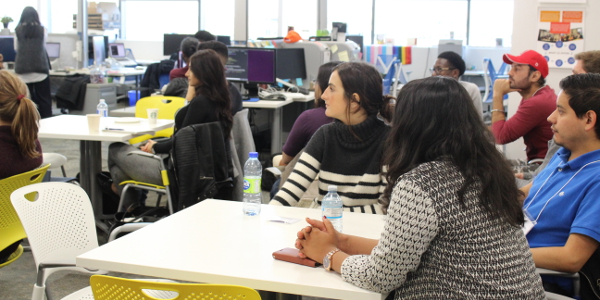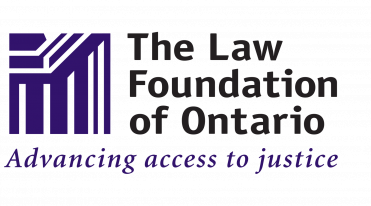The Law Foundation of Ontario is pleased to announce that the Winkler Institute at Osgoode Hall Law School and Ryerson University’s Legal Innovation Zone have each received a grant to examine the roles technology and innovation can play to improve access to justice for young people.
The Foundation has a long history of supporting organizations that teach children and youth about the legal system and their legal rights. These one-time grants will create opportunities for the Foundation, tech experts and entrepreneurs, Foundation grantees, justice sector partners, and youth to work together to enhance access to justice in Ontario.
“Together, these projects will give the Foundation insight into how technology can be harnessed to help young people facing legal problems,” explains Linda Rothstein, the Foundation’s Board Chair. “The projects will enable youth to explore creative solutions while allowing them to create tangible prototypes that use technology to improve access to justice.”
This effort to improve youth access to justice was inspired by Elizabeth Goldberg, who was the Foundation’s CEO from 2007-2015 and previously served on its Board of Trustees. “It was Liz who first identified innovation in technology as an exciting opportunity for the Foundation to better connect with, and serve youth, which exemplifies the dynamic leadership she brought to all her work at the Foundation,” says Linda Rothstein.
Technology and youth access to justice
Ryerson University, Legal Innovation Zone
Improving Access to Justice for Young People
$50,000
The Legal Innovation Zone at Ryerson University, working closely with The Law Foundation of Ontario, youth-serving agencies, and the broader community, will develop a series of collaborative and innovative workshops focused on urban youth.
Foundation grantees with expertise in youth justice, including the Ontario Justice Education Network, young people, entrepreneurs, and technology experts will participate in a multi-session process to explore the legal needs of urban youth and give them tools to help them build solutions that meet their needs. By inviting a diversified group of participants who may not otherwise interact, the project endeavours to address the issue of youth access to justice from varying perspectives.
The Legal Innovation Zone will produce a white paper report that outlines the methodology of the project, the key themes identified in each session, and provides detailed descriptions of the early ideas. Other groups and organizations will then be able to access this white paper and share in what we learn about youth justice issues.
“We look forward to engaging and challenging the community by inviting people of different backgrounds, perspectives, and expertise to come together and help develop new approaches to advance and improve youth access to justice,” said Chris Bentley, Executive Director, The Legal Innovation Zone. “Technology can help reframe the questions and open exciting new opportunities to develop better solutions to existing challenges.”
The Winkler Institute/Osgoode Hall Law School
Design Thinking and Technology: Responding to the Justice Needs of Aboriginal Youth
$54,083
The Winkler Institute for Dispute Resolution, based at Osgoode Hall Law School, will undertake a design-thinking exercise to develop ideas for technology solutions that address the need to build a justice system and jury process that is reflective of Indigenous experiences and traditions.
Indigenous youth from Thunder Bay and surrounding fly-in communities will gather with experts in youth justice and design-thinking. This multi-day session will focus on the needs of young people and will create space for youth to define the problems they face and develop solutions that meet their needs. This project continues work started through Feathers of Hope and focuses on recommendations made by young Indigenous people about justice and juries. Feathers of Hope is an initiative of the Provincial Advocate for Children and Youth, which brings northern Indigenous youth together to share their experiences and develop action plans.
Project partners include Justice for Children and Youth, a child and youth rights organization and community legal clinic, and the Ontario Justice Education Network, a not-for-profit organization that develops educational tools and programs that introduce young people to the justice system, builds their legal capability, and prepares them to manage the legal aspects of everyday problems. In addition, organizers will work in partnership with the Office of the Provincial Advocate for Children and Youth, Feathers of Hope Youth Amplifiers, and Indigenous community leaders and organizations in Thunder Bay.
“Design thinking is not simply a set of design tools, but a way of thinking that can empower, excite, and encourage positive social change,” said Nicole Aylwin, Assistant Director, Winkler Institute for Dispute Resolution. “We look forward to working with the Feathers of Hope Youth Amplifiers and all of our partners to explore how technology can enhance and redefine engagement with the justice system in ways that are driven by youth perspectives.”

About the Ryerson’s Legal Innovation Zone
The Legal Innovation Zone at Ryerson University is a co-working space and incubator for the people and ideas that will change the status quo of Canada’s legal system. Based on the model of the DMZ — North America’s #1 university incubator, where more than 200 startups have grown their businesses — the Legal Innovation Zone helps support, foster, and develop solutions, and technologies that aim to improve legal services and the justice system.
About the Winkler Institute, Osgoode Hall Law School
The Winkler Institute for Dispute Resolution is devoted to justice innovation and excellence in teaching, research, and reform-based practical application. Its mandate is to develop and implement research and pilot projects that improve the justice system by making it more accessible, public focused, usable, and sustainable.

